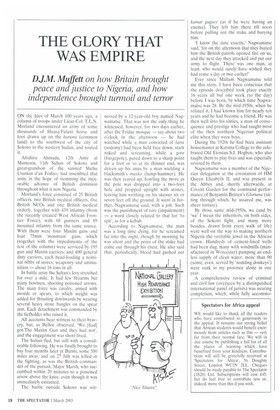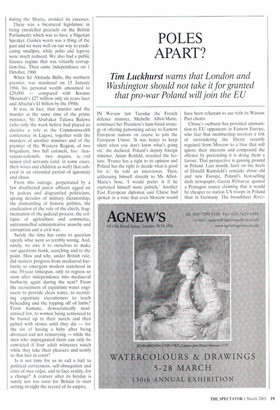THE GLORY THAT WAS EMPIRE
D.J.M. Muffett on how Britain brought
peace and justice to Nigeria, and how independence brought turmoil and terror
ON the Ides of March 100 years ago, a column of troops under Lieut-Col. T.L.N. Morland encountered an army of some thousands of Hausa/Fulani horse and foot drawn up on the hurumi (common land) to the southwest of the city of Sokoto in the western Sudan, and routed it.
Attahiru Ahmadu, 12th Amir al Munaenin, 11th Sultan of Sokoto and great-grandson of the sainted Shehu Usuman d'an Fodiyo, had assembled that army in the hope of stemming the inexorable advance of British dominion throughout what is now Nigeria_ Morland's force consisted of 25 British officers, two British medical officers, five British NCOs and one British medical orderly, together with 439 infantry (from the recently created West African Frontier Force), with 68 gunners and 89 mounted infantry from the same source. With them were four Maxim guns and four 75mm 'mountain' guns, which (together with the impedimenta of the rest of the column) were serviced by 195 gun and Maxim carriers, and 400 general duty carriers, each head-loading a nominal 601bs of stores, weaponry and ammunition — about 16 tons in all.
In battle array the Sultan's levy stretched for over a mile. It had few firearms but many bowmen, shooting poisoned arrows. The main force was cavalry, armed with swords or spears, to which weight was added for thrusting downwards by wearing several heavy stone bangles on the spear arm. Each detachment was commanded by the fiefholder who raised it.
All accounts bear witness to their bravery, but, as Belloc observed. 'We [had] got/The Maxim Gun and they had not', and the engagement was short-lived.
The Sultan fled, but still with a considerable following. He was finally brought to bay four months later at Burmi, some 500 miles away, and on 27 July was killed in the fighting, as was the British commander of the pursuit, Major Marsh, who succumbed within 20 minutes to a poisoned arrow above the knee, even though it was immediately extracted.
The battle outside Sokoto was wit nessed by a 12-year-old boy named Nagwamatse. That was not the only thing he witnessed, however, for two days earlier, after the Friday mosque — say about two o'clock in the afternoon — he had watched while a man convicted of hitsu (sodomy) had been held face down, stark naked and screaming, while a gora (bargepole), pared down to a sharp point for a foot or so at its thinner end, was driven up his anus by a man wielding a blacksmith's masko (lump-hammer). He was then reared up, howling the more as the pole was dropped into a two-foot hole and propped upright with stones, leaving him writhing on his skewer six or seven feet off the ground. It went in further, Nagwamatse said, with a jolt. Such was the punishment of tsire (impalement) — a word closely related to that for 'to spit', as for a kebab.
According to Nagwamatse, the man was a long time dying, for he screamed far into the night, though by morning he was silent and the point of the stake had come out through his chest. He also said that, periodically, blood had gushed out kamar guguce (as if he were having an enema). They left him there till noon before pulling out the stake and burying him.
'I know the date exactly,' Nagwamatse said, 'for on the afternoon that they buried him the British patrols opened fire on us, and the next day they attacked and put our army to flight. There was one man, at least, who would surely have wished they had come a day or two earlier!'
Ever since Mallam Nagwamatse told me this story, I have been conscious that the episode described took place exactly 16 years all but one week (to the day) before I was born, by which time Nagwamatse was 28. By the mid-1950s, when he related it, I had known him for nearly ten years and he had become a friend. He was then well into his sixties, a man of consequence and prestige who had taught most of the then northern Nigerian political elite when they were boys.
During the 1920s he had been assistant housemaster at Katsina College to the celebrated Old Etonian S.J. Hogben, who also taught them to play fives and was especially revered by them.
Nagwamatse was a member of the Nigerian delegation at the coronation of HM Queen Elizabeth II, and was present in the Abbey and, shortly afterwards, at Covent Garden for the command performance of Benjamin Britten's Gloriana (sitting through which, he assured me, was sheer torture).
By those same mid-1950s, we (and by 'we' I mean the inheritors, on both sides, of the Sokoto fight, and many more besides, drawn from every walk of life) were well on the way to making northern Nigeria the veritable jewel in the African crown, Hundreds of cement-lined wells had been dug, many with windmills (manufactured in Worcester) pumping an endless supply of clean water: more than 90 (some, even, served by 'nodding donkeys') were sunk in my province alone in one year.
A comprehensive review of criminal and civil law (overseen by a distinguished international panel of jurists) was nearing completion, which, while fully accommo dating the Sharia, avoided its excesses.
There was a bicameral legislature in being (modelled precisely on the British Parliament) which was to have a Nigerian Speaker. Guinea worm was a thing of the past and we were well on our way to eradicating smallpox, while polio and leprosy were much reduced. We also had a public finance regime that was virtually corruption-free, Then came independence on 1 October, 1960.
When Sir Ahmadu Bello, the northern premier, was murdered on 15 January 1966, his personal wealth amounted to £29,000 — compared with Kwame Nkrumah's £27 million only six years later and Abacha's £1 billion by the 1990s.
It was, in fact, that murder and the murder at the same time of the prime minister, Sir Abubakar Tafawa Balewa (who only the week before had played so decisive a role at the Commonwealth conference in Lagos), together with the murders of another minister and of the premier of the Western Region, of two brigadiers, two full colonels, foili lieutenant-colonels, two majors, se 3ral senior civil servants (and, in some cases, their wives and children as well) that ushered in an extended period of ignominy and chaos.
From this outrage, perpetrated by a few disaffected junior officers egged on by jealous and disgruntled politicians, sprang decades of military dictatorship, the dismantling of historic polities, the eradication of the role of the chiefs, fragmentation of the judicial process, the collapse of agriculture and commerce, untrammelled administrative anarchy and corruption and a civil war.
Surely the time has come to question openly what went so terribly wrong. And, surely, we owe it to ourselves to make our questions frank, searching and to the point. How and why, under British rule, did matters progress from mediaeval barbarity to emergent modern statehood in one 50-year timespan, only to regress so soon after independence into mediaeval barbarity again during the next? From the recruitment of expatriate water engineers to provide clean water, to recruiting expatriate executioners to teach beheading and the lopping off of limbs? From humane, democratically modernised law, to women being sentenced to he buried up to their navels and then pelted with stones until they die — for the sin of having a baby after being divorced and not remarrying — while the men who impregnated them can only be convicted if four adult witnesses watch while they take their pleasure and testify to that fact in court?
Is it not time for us to call a halt to political correctness, self-abnegation and cries of mea eulpa, and to face reality, for a change? A century after its heyday is surely not too soon for Britain to start setting straight the record of its empire.



















































































 Previous page
Previous page